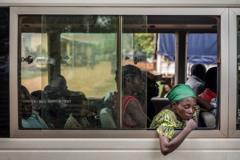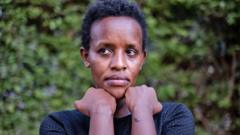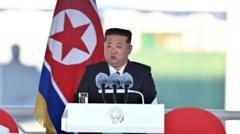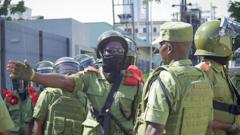The plight of deported Venezuelans, trapped in a maximum-security prison in El Salvador, highlights the humanitarian crisis as families voice their anguish over lost communication and perceived injustices.
Venezuelan Families Suffer as Deportees End Up in El Salvador's Mega-Prison
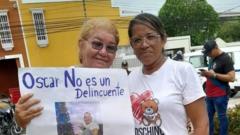
Venezuelan Families Suffer as Deportees End Up in El Salvador's Mega-Prison
Families contend with the disappearance of their loved ones as they face deportation and incarceration in a notorious facility in El Salvador.
In a shocking episode highlighting the plight of displaced Venezuelans, families are grappling with the loss of their loved ones, reportedly taken to a notorious prison in El Salvador after being deported from the United States. Gertrudis Pineda, distressed and desperate for information about her son Oscar, who once lived an ordinary life in Dallas, Texas, now faces an unthinkable reality, mournfully referring to her son’s situation as a nightmare.
Oscar, a hard-working migrant who sent money back home for medical care, has found himself among 238 Venezuelans accused of being affiliated with gangs and imprisoned in El Salvador's "Terrorism Confinement Centre" (Cecot). The U.S. government implemented deportation under the Alien Enemies Act, leading to intense scrutiny over the legality and ethics of these actions, especially since many of those deported reportedly have no criminal records.
As she speaks from Zulia state, Venezuela, Gertrudis describes her agony, recently learning of Oscar's condition through news broadcasts that shared images of the deportees being processed in the prison. The maximum-security facility has earned a reputation for its human rights violations, a concern that resonates deeply with Gertrudis as she questions the principles of justice being upheld in her son's case.
The U.S. administration has defended the deportations, claiming the detainees represent an imminent threat. This assertion is contested by human rights advocates and legal experts in El Salvador, where concerns about constitutional violations regarding the treatment of these prisoners are mounting. Despite these pressures, El Salvador's President Nayib Bukele maintains a hardline stance against crime, pledging to continue his aggressive measures against gang violence.
Legal negotiations to secure the release of the detainees are complicated and hindered by a lack of transparency. Jaime Ortega, appointed by Venezuelan officials, expresses the unprecedented nature of this detention scenario, articulated as a violation of basic humanitarian principles.
As communities in El Salvador slowly recover from gang violence under Bukele's policies, the shadows of oppression still linger, manifesting in fear and voicelessness among innocent civilians, many of whom feel the impact of mass arrests and systemic injustice. The disturbing reality faced by families like Gertrudis’s, who find themselves separated by borders and prisons, raises critical questions about the future of asylum seekers and the ethical repercussions of such deportation policies.
With each passing moment, Gertrudis longs for her son's return, echoing the cries of other families entangled in this unfolding tragedy. "Send them home," she pleads, encapsulating the heart-wrenching narrative shared by countless others in a similar plight. The layers of desperation and human suffering continue to unravel, revealing a complicated tapestry of injustice rooted in cross-national policies.



